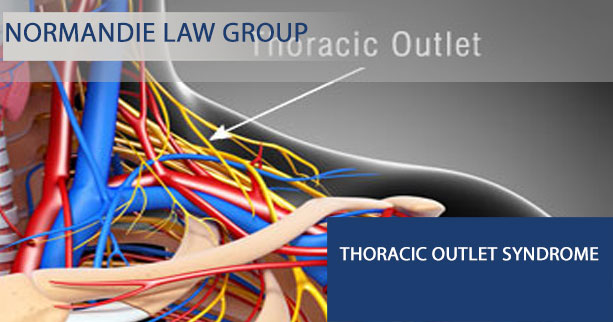Car accidents can cause a plethora of injuries, ranging from soft tissue damage to neurological troubles. The sudden impact and blunt trauma can be debilitating and the injuries may be permanent. It is important that you identify your injuries from a car accident and get the appropriate medical assistance and legal help that you need. A potential injury that can happen in car accidents is thoracic outlet syndrome, a painful disorder that affects the clavicle/arm region. If you have been in a car accident and you found yourself suffering from thoracic outlet syndrome in its wake, you can file a lawsuit against the responsible driver. Our team of attorneys at Normandie Law Firm can help you receive the compensation you deserve.
Thoracic Outlet Syndrome: What is it?
The clavicle, or collarbone, is the area between the neck and the arm, located at the upper side of the chest. It contains numerous muscles, tendons, and nerves that help motion. The thorax, or upper body, is connected to the arm through this area. Directly in front of the clavicle lies the thoracic outlet, which is a collection of nerves and vessels; it includes the brachial plexus, subclavian vein, and subclavian artery. These parts can be compressed, or have another part of the body protrude onto it or stick into it. Commonly, the brachial plexus is most often affected, known as neurogenic thoracic outlet syndrome. Less often, the vein or artery is compressed, leading to vascular thoracic outlet syndrome.
You can identify thoracic outlet syndrome by the following symptoms:
- Muscular atrophy near the thumb
- Blue hue or discoloration of the hand
- Tingling, numbness, or loss of sensation in the fingers
- Inflammation or swelling in the arm
- Persistent aches and pain in the arm, neck, and shoulder
- Weak pulse in the arm
- Weak grip in the hand
- Cold or chilly hand and fingers from lack of blood flow
- Lump that throbs near your clavicle
- Blood clots in the arm

Because thoracic outlet syndrome is related to compression of nerves and arteries, it is a condition that can worsen over time. If a nerve is perpetually compressed, it can eventually die off or become hyper sensitive, leading to excruciating pain. It is not dissimilar to CRPS, which is a syndrome in which pain receptors constantly fire off. The pain has been described as comparable. It can also influence carpal tunnel syndrome and cubital tunnel syndrome.
What are causes of thoracic outlet syndrome?
There are multiple ways that thoracic outlet syndrome can occur. Some are unable to be fixed and may be present at birth, as with congenital birth defects in the connective tissue or bone, or may happen over time, such as with excessively poor posture or repetitive motions and activities. However, one common cause is blunt trauma or pressure on the joint.
In car accidents, you can be pinned against the seat, thrown into the glass, crushed against the dashboard and steering wheel, stuck against the door, and more. You may also simply have large, hard pieces of metal and plastic smash into you, or you could be pushed into another car or experience a rollover accident. A rear end collision can also cause the syndrome.
The sudden trauma can be enough to cause the bone or other tissue to press down and compress the nerve or artery. However, even though the trauma can be sudden in a car accident, the actual effects of the thoracic outlet syndrome may not be noticed for a few days.
What steps can I take after a car accident?
If you have been in a car accident, it is important that you follow a set procedure so you have the best chance of success and so that your health is not further compromised.
Firstly, you should go to the doctor or hospital for treatment, or you can have the paramedics take you to the emergency room if you were seriously injured. The healthcare professional can evaluate you and determine the extent of your damages and how the thoracic outlet syndrome can be treated. You should go to the doctor at any point you experience pain thereafter as well.
Going to the doctor quickly allows you to collect the notes and receipts to submit to your claim. It also protects your claim because there is no large gap between the incident and the injury.
If you do delay treatment immediately form the scene, this allows you to gather evidence while you still can. This means that you can take pictures of the scene of the accident the car that hit you and potentially secure videos or dash cam footage of the accident. Pictures of your injuries will also come in handy.
You can then write down the contact information, insurance details, license plate number, and more of the other necessary personal details from the driver.
If possible, locate eyewitnesses and bystanders so that you can get their statements on what happened. It is helpful to have additional perspectives to support your case.
The police may have come to the scene of the accident to conduct an investigation; you can request a copy of the police report when it has been submitted to the precinct and is done processing.
Finally, it is in your best interest to contact a skilled lawyer who has experience in filing thoracic outlet syndrome injury lawsuits stemming from car accidents. You may not have any legal experience at all, and if you try to file a claim by yourself, you could potentially have it thrown out very early on. Our attorneys will fight to win you the compensation you deserve, and we will make sure you are fairly represented while you focus on the recovery process.
What is the value of a thoracic outlet syndrome lawsuit?
An average settlement for thoracic outlet syndrome can depend on the circumstances of the accident. The insurance agent assigned to your case will measure the worth of it by determining the extent of your injuries, the effect the damage had on your life and career, and how at-fault you were for the accident. He will essentially make an offer based off those points. Our attorneys will then negotiate a fair deal with him. Therefore, there is no surefire way to know how much a lawsuit will be worth.
Some thoracic outlet syndrome lawsuits have settled for over $1,000,000 due to the circumstances of the incident. The individuals may have suffered additional injuries, like brain damage and severed limbs, and their vehicles may have been totaled beyond repair. The amount of pain and suffering could also influence the total worth of the case.
Given that the syndrome can lead to long-lasting damages, the value of your case could increase the longer it takes to settle. Our goal is to ensure that you are fully covered for the extent of the pain.
What can I win in a thoracic outlet syndrome claim?
You can win numerous kinds of compensation if you suffered a thoracic outlet syndrome injury in a car accident. We will see to it that you are given the following types of compensation:
- Medical expenses from the past and future to cover all the treatments, medication, surgery, and more that you will need
- Lost income if you could not return to work a period of time due to recovery or injuries
- Property damage for the repairs needed for your car or to replace any lost or broken items
- Pain and suffering damages for the emotional trauma, psychological anguish, PSD, anxiety, fear, and more that can occur after a crash
With the help of our lawyers, you can be totally off the hook when it comes to the expenses relating to the incident.
What is the statute of limitations for a thoracic outlet syndrome injury lawsuit?
The statute of limitations in California is 2 years from the date of the injury. If you do not file a claim within that period, you will not be able to receive any compensation at all. The statute of limitations is in place to keep claims from being delayed or from not being filed when there is still ample opportunity to get covered.
There are a few ways in which the statute of limitations can be temporarily extended. This is common in instances where the victim is under the age of 18 or when he has been left mentally or physically incapacitated. The victim can sue when he turns legal age or when he returns to full health. Additionally, the defendant must be in the state when the lawsuit is filed, or the statute will be suspended until the time he returns.
How Our Firm Helps
Normandie Law Firm in Los Angeles can bring you the compensation you need if you were afflicted with thoracic outlet syndrome after a car crash or other incident. We have a team of expert lawyers with years of experience in personal injury litigation, and we know the best tactics tow in your claim for you. If we need to go to court, our aggressive lawyers are willing to do so.
Get in touch with our offices today for a free legal consultation to discuss the contents of your case and what you could expect. We will tell you how much we think your case is worth and we invite you to ask us any questions that you wish. If you want to hire us, we will also give you our zero fee guarantee, which says that you will not have to spend a dime of your own money on legal fees. We will cover all the costs of the case from start to finish, and we will only get compensated if we win. The money will come from the insurance settlement we win for you. In the event that we lose, we do not get paid at all, and you can walk away from our firm debt-free.
Don’t let the responsible driver get away with not paying for the damages related to the car accident and your thoracic outlet syndrome. Let Normandie Law Firm help you win the rightful restitution you need.











